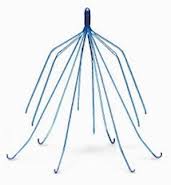 Safety risks increase when temporary blood clot filters are not removed for long periods of time. The FDA has received hundreds of reports of the filters breaking, moving, perforating internal organs, and more.
Safety risks increase when temporary blood clot filters are not removed for long periods of time. The FDA has received hundreds of reports of the filters breaking, moving, perforating internal organs, and more.
Need an IVC Filter Lawyer in Texas? Collen A. Clark is a true advocate for his clients and is passionate about helping Texans. If you or a loved one has an IVC filter implant, even if you were not injured by side effects, you should contact our lawyers immediately. You may be entitled to compensation by filing a lawsuit.
What is the problem?
Blood clot filters are used to capture blood clots in the inferior vena cava, which is the major blood vessel between the lower half of the body and the heart. The filters are primarily used in patients who cannot take a blood-thinning medication, but are at high risk of a pulmonary embolism (blood clots in the lungs).
Types of Vena Cava Filters
Retrievable vena cava filters are designed to be removed once a patient’s risk of pulmonary embolism subsides. Some of the most popular products are listed below.
C.R. Bard retrievable IVC filters:
- Bard Recovery IVC Filter (withdrawn in 2005)
- Bard G2 IVC Filter
- Bard G2 Express IVC Filter
- Bard G2x
- Meridian
- Eclipse
- Denali
Other retrievable IVC filters:
FDA Warning
Between 2005 and 2010, the FDA received nearly 1,000 adverse event reports involving blood clot filters. The agency issued a Safety Communication and warned:
“The FDA is concerned that these retrievable IVC filters, intended for short-term placement, are not always removed once a patient’s risk for PE subsides. Known long term risks associated with IVC filters include but are not limited to lower limb deep vein thrombosis (DVT), filter fracture, filter migration, filter embolization and IVC perforation.”
When Should a Blood Clot Filter be Removed?
In 2014, the FDA recommended removing temporary blood clot filters within 29-54 days after implantation in patients who were not at risk of a pulmonary embolism. Delayed removal could increase the long-term safety risks.
Long-Term Safety Risks
- Blood clots in the lower legs (deep vein thrombosis)
- Broken or fractured filter legs (“struts”)
- Embolization of filter fragments inside the body
- Erosion or perforation of the vena cava, heart, or lungs
- Surgery cannot remove broken pieces of the filter
- Blood clots clog the filter
- Migration of the filter inside the body
- And more
IVC Filter Lawsuit Information
Free Confidential Lawsuit Evaluation: If you or a loved one has an IVC Filter, our lawyers would like to speak with you immediately. We are evaluating every case regardless of whether you experienced side effects or not. You may be entitled to compensation by filing a lawsuit. Please use the form below to contact our lawyers or call us toll free 24 hours a day at (866) 879-3040.
How Can a Blood Clot Filter Lawyer Help?
The Clark Firm, LLP specializes in helping victims of defective medical devices seek compensation and justice. There are already at least 27 lawsuits involving Cook Medical blood clot filters pending in 11 district courts, and dozens more involving filters manufactured by C.R. Bard. These lawsuits may be consolidated into a mass-tort, which is similar to a class action. If you were injured, our lawyers may be able to help you join this growing litigation.
Need a Blood Clot Filter Lawyer in Texas?
Collen A. Clark is a true advocate for his clients and is passionate about helping Texans that have been injured or wronged.
Collen’s amazing success in the courtroom and well known dedication to his clients has earned him the recognition of his peers as one of The Top Trial Lawyers in Texas.”
The Clark Firm has assembled a team of trial lawyers with more than 100 years experience, participation in over 600 jury trials and $260 million in verdicts and/or settlements. Please use the form below to contact our Texas blood clot filter lawyers for a free lawsuit review.


 To contact us for a free review of your potential case, please fill out the form below or call us toll free 24 hrs/day by dialing:
To contact us for a free review of your potential case, please fill out the form below or call us toll free 24 hrs/day by dialing: